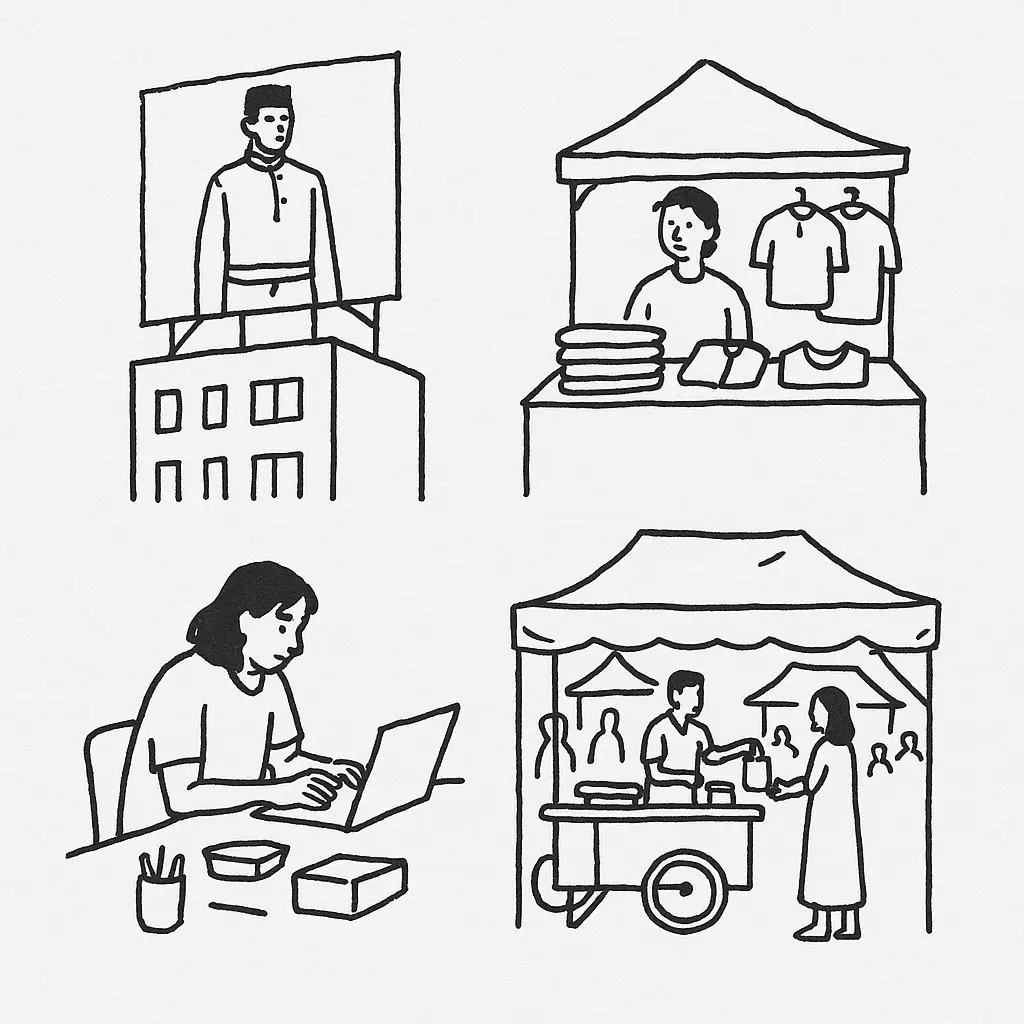You can tell a lot about a country by the way it sells things. Malaysia, in this moment, is a marketplace of ambition, aesthetics, and adaptation. Local brands aren’t just growing, they’re multiplying, morphing, and marching onto timelines and pasar malam stalls alike.
But “local brand” no longer means just one thing. It’s no longer confined to a hand-embroidered tote or a jar of sambal with a handwritten label. Today, “local” could mean a multimillion ringgit campaign with national reach or a single parent making cookies in between school runs.
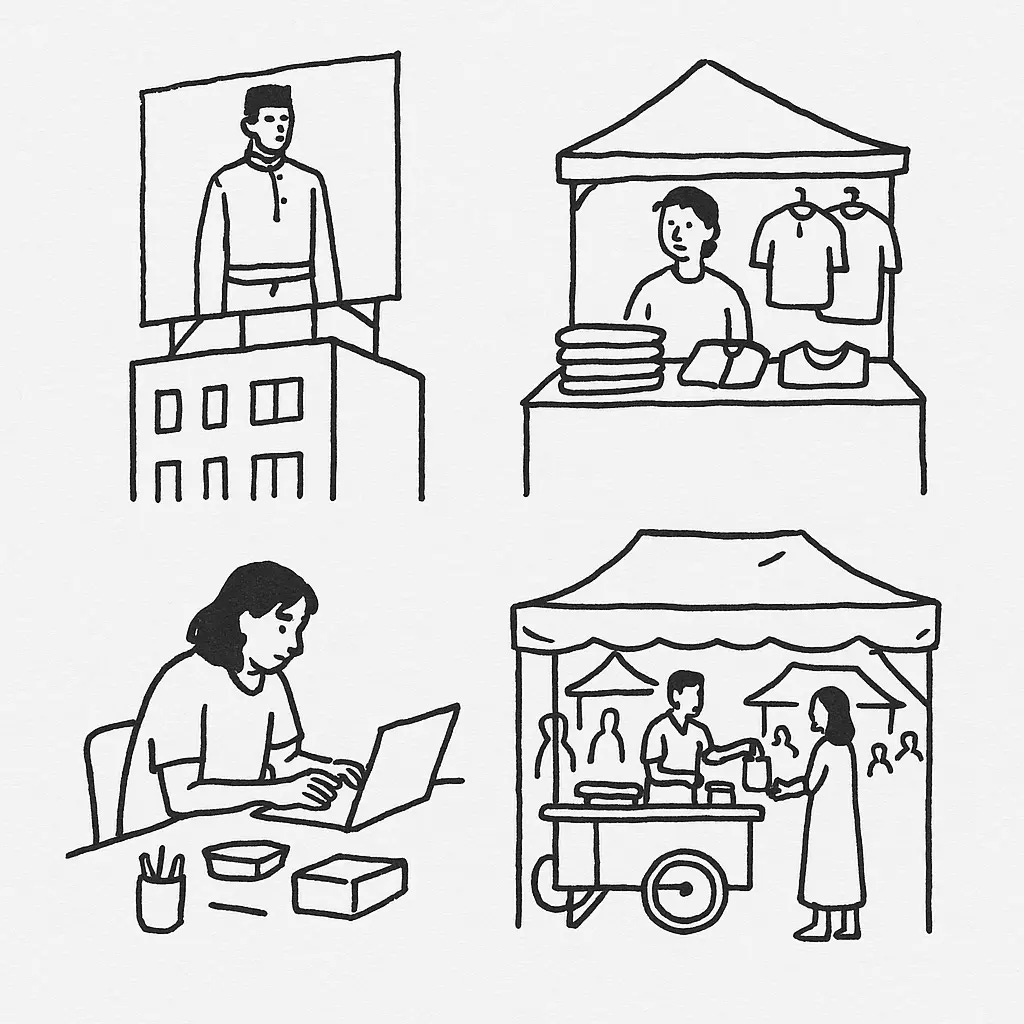
Here, we break down the new local economy into four distinct but interconnected archetypes. Each with its rhythm, its struggle, its kind of magic.
The Viral Darlings: Billboard Ambition, TikTok Precision
These are the brands that announce themselves with all the subtlety of fireworks over Bukit Bintang.
You don’t discover them, THEY FIND YOU.
Their presence is choreographed, cinematic, and everywhere. From LED billboards in Kuala Lumpur to influencers posing with limited-edition drops in cafes you can’t pronounce, they’re playing to win.
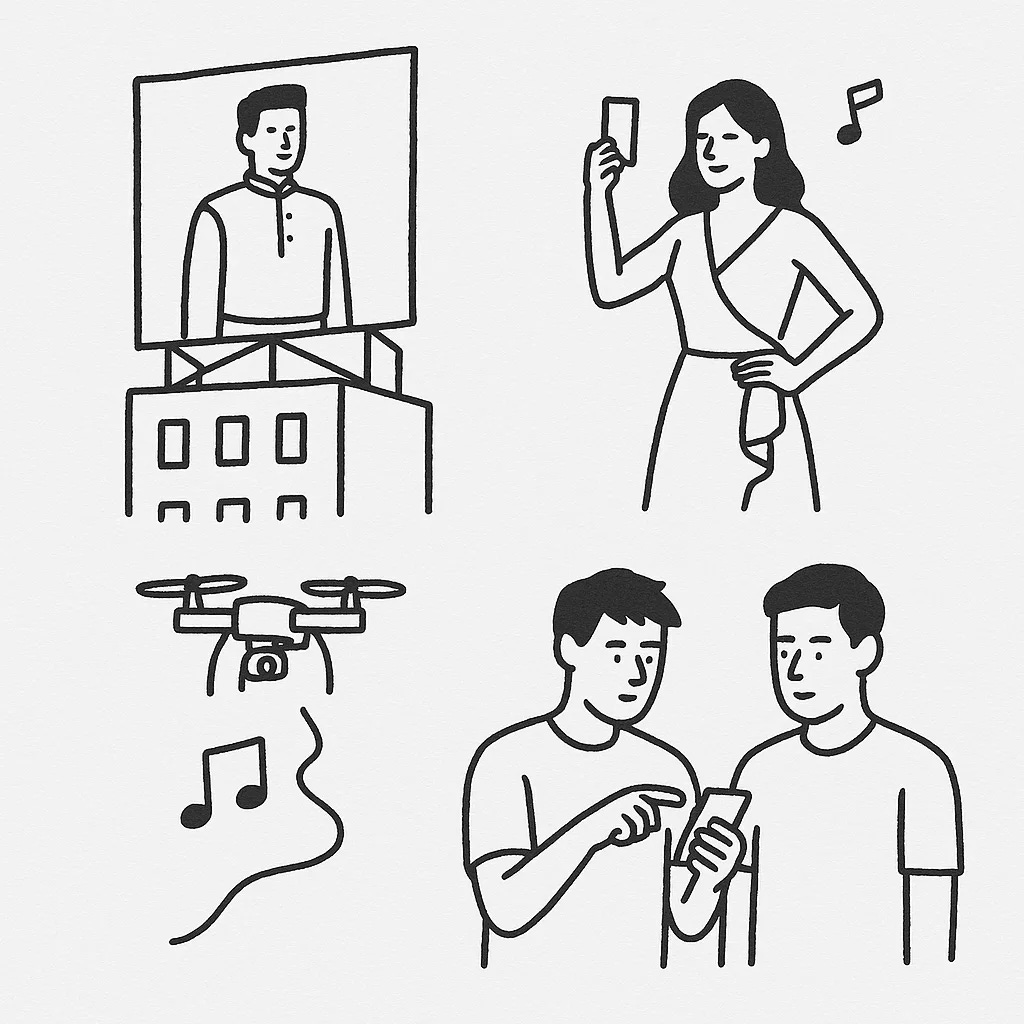
Backed by investors, refined by agencies, and rolled out like Netflix trailers, these brands have budget and aren’t afraid to spend it. The aesthetics? Immaculate. The storytelling? Market-tested. The reach? Algorithmically aggressive.
Just look at Bulan Bintang, a brand that turned baju Melayu into a phenomenon, complete with countdown launches, spotlights on Pavilion, and pre-order madness. Or Elrah Exclusive, whose tailoring finesse meets TikTok savvy, capturing both the urban professional and kampung nostalgic in one frame. Then there’s Khatam, a quieter force, but no less commanding. Rooted in heritage and rich with aesthetic intention, their pieces blend tradition with modern elegance. Every customer is treated like royalty, not through gimmicks, but through genuine, attentive service. These brands aren’t just selling clothes they’re selling aspiration, identity, and internet clout.
Not sure if Khairul Aming should fall under this category, but his journey speaks volumes. We’ve watched him hustle from sambal drops that break the internet to honest, heartfelt content that makes even the most digital-savvy consumer pause. His brand isn’t just built on marketing; it’s built on trust, storytelling, and relentless authenticity. He may straddle categories, but one thing’s clear: he’s made “local” feel deeply personal, and undeniably powerful.
And yes, some of these campaigns are brilliant, striking the balance between emotion and execution. But others feel like sandcastles in the content tide. Built to go viral, not to last. When every brand starts sounding like a marketing major’s dream, the soul can get lost.
Still, we can’t write them off. They reflect where local ambition is headed: global in taste, meticulous in strategy. But the question remains, when the smoke clears, what are we left with?
2. The Indie Romantics: Pop-Up Philosophers and Tote Bag Dreamers
If the viral brands are skyscrapers, indie brands are terrace houses filled with mismatched furniture and heart. You find them at pop-ups in Pasar Seni, in the corner stalls of Riuh, or sharing booths at car boot sales in Subang, Melawati, and TTDI. These are the weekend wanderers and late-night dreamers, setting up tables under fairy lights, weaving culture into canvas bags, zines, enamel pins, and homemade soaps. It’s in these neighbourhood spaces where brands meet buyers without pretense, that local identity breathes freely.
They’re not here for scale. They’re here for substance. Every product tells a story, maybe heartbreak stitched into a t-shirt, or nostalgia bottled into handmade perfume. They don’t have paid media strategies. What they have is presence: face-to-face connection, curated imperfections, playlists that bleed into the air as you browse.
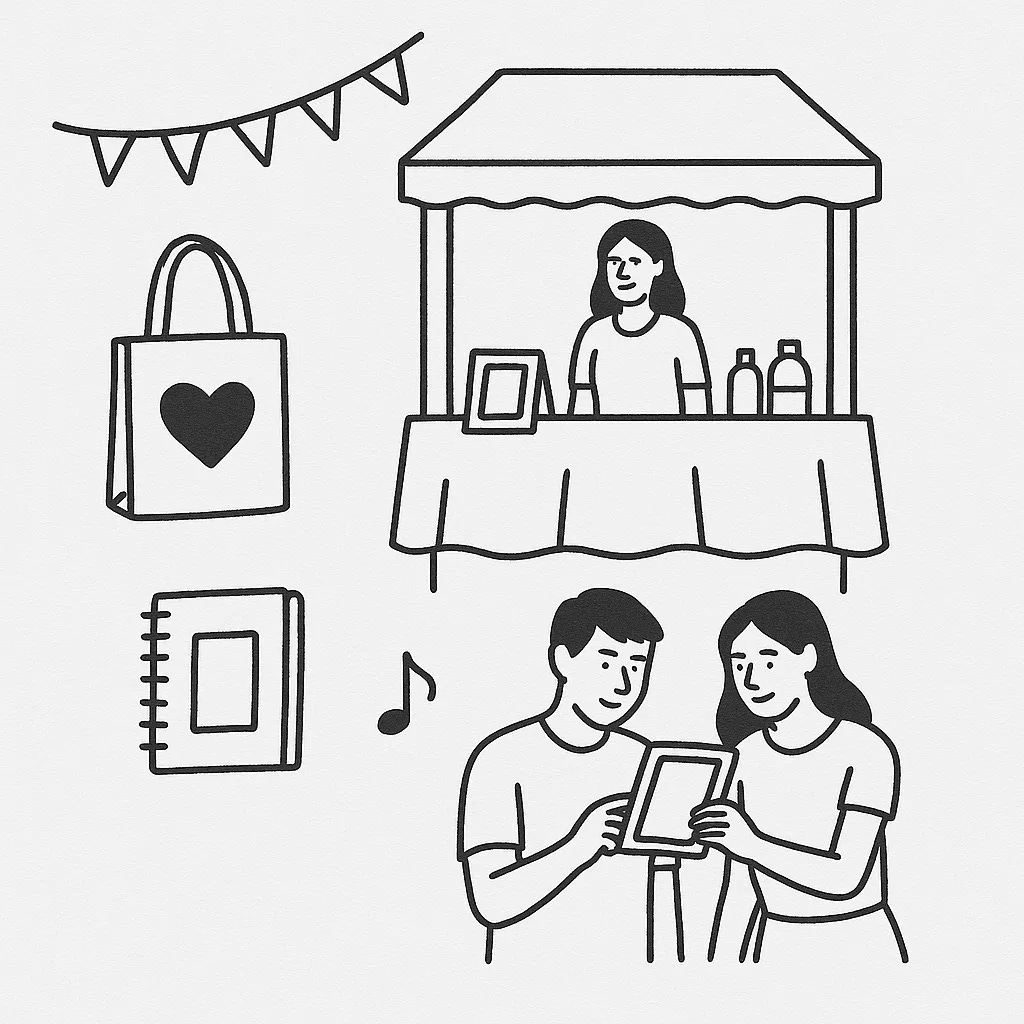
Think of brands like ana tomy, whose custom notebooks have turned journaling into an art form. Or Mossery, a Malaysian-grown stationery name with global cult love. Or Su by Hand, creating timeless, hand-dyed clothing with a slow fashion ethos. Their growth is slow, sometimes stubborn, but always sincere. They don’t chase trends. They build culture. In a sea of sameness, they remain defiantly specific.
3. The Hustle Alchemists: Bedroom Creators and DM Warriors
These are the unsung architects of the new local. Entrepreneurs who start not with a plan, but with a problem… usually financial, often personal. They build brands between shifts, care for children while packing orders, and reply to customer queries from beds they rarely sleep in.

Their factories? Bedrooms. Their branding team? Themselves, a friend, and Canva Pro.
What they lack in polish, they make up for in proximity. They know their customers’ names. They post real updates, not press releases. They navigate WhatsApp group buy-ins and FB Komuniti groups like seasoned digital hawkers.
And even as they burn out, they persist. Because this isn’t side hustle chic. This is survival. This is creativity under constraint. And often, this is where the most authentic Malaysian-made products come to life.
4. The Pasar Malam Originals: Street-Level Legends Without Logos
Before “support local” was a hashtag, it was a handshake. A familiar face in a night market. A stall you grew up visiting. These are the OGs, no agencies, no TikTok strategy, just pure skill and trust.
You’ll find them in night markets like Taman Connaught, Setia Alam, SS2, and Kampung Baru, places where the scent of grilled chicken wings mixes with the rhythm of familiar banter. These pasar malams aren’t just economic hubs; they’re cultural archives wrapped in steam and neon.
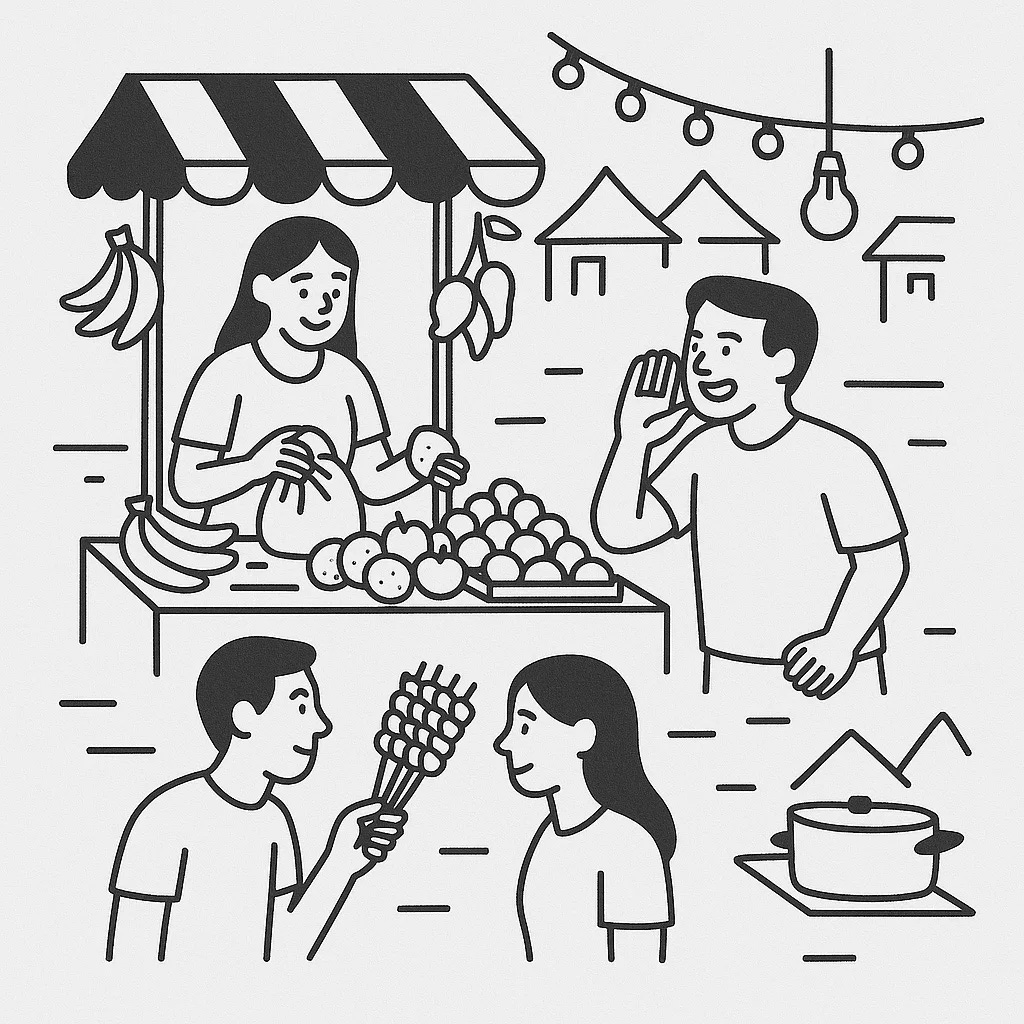
They may not have Instagram pages, but their customer base spans generations. Their branding? A mix of neon lights, tarpaulin covers, and voices that cut through the night calling, “MURAH MURAH!”
These brands operate on instinct. They understand seasons, supply chains, and human behavior better than any analytics dashboard. And while their business might look low-tech, their impact is immeasurable.
They remind us that local isn’t a trend. It’s a tradition.
So What Now?
Malaysia’s local economy is layered. It’s not just about who shouts the loudest, but who shows up consistently. The viral brand has reach, but does it have roots? The indie brand has taste, but does it scale? The bedroom brand has heart, but can it sustain? The pasar malam brand/business has history, but can it evolve?
We need them all. And more importantly, we need to see them all.
Because local isn’t a logo. It’s a language. And every seller, whether behind a billboard or a plastic foldable table, is adding to the Malaysian lexicon of hustle, hope, and homegrown pride.
So next time you click, browse, or buy, ask not just what it costs. Ask what it carries.
-By Azlan
